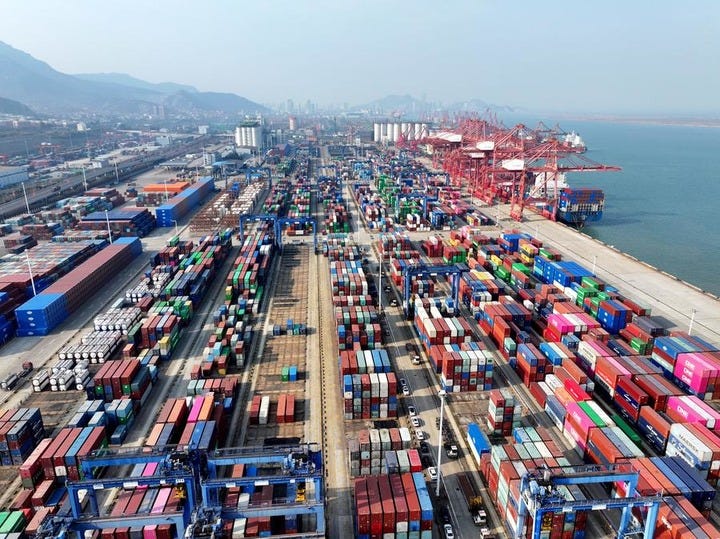Must-Read China Economic News (Dec. 24-31)
China debuts prototypes of world's fastest high-speed train; China's manufacturing and non-manufacturing PMI; China to cut import tariffs ...
Greetings and welcome to the latest edition of Peking Ensight! We're thrilled to have you join us once again as we navigate the ever-evolving landscape of the Chinese economy.
⭐Under the Spotlight
China debuts prototypes of world's fastest high-speed train
Prototypes of the CR450 bullet train, with a test speed of up to 450 kilometers per hour and an operational speed of 400 kilometers per hour, were debuted in Beijing on Sunday, highlighting China's cutting-edge advancements in rail technology and contributions to the global rail industry.
The CR450 is significantly faster than the CR400 Fuxing high-speed trains currently in service, which operate at speeds of 350 kilometers per hour.
The China State Railway Group Co., Ltd. will arrange a series of line tests for the prototypes and optimize technical indicators to ensure the CR450 enters commercial service as soon as possible.
⭐ Key Macroeconomic Indicators
PMI
The purchasing managers' index (PMI) for China's manufacturing sector came in at 50.1 in December, down from 50.3 in November.
The PMI for China's non-manufacturing sector came in at 52.2 in December, up from 50 in November.
A reading above 50 indicates expansion, while a reading below 50 reflects contraction.
China revises up 2023 GDP
China's 2023 GDP has been revised to 129.4 trillion yuan (about 18 trillion U.S. dollars). The amount represents an increase of 3.4 trillion yuan from the preliminary calculation.
China's operating high-speed railway hits 47,000 km
The total length of China's operating high-speed rail tracks has reached about 47,000 km, while the country's total operating mileage of railway network amounted to 162,000 km.
A total of 3,000 km of new tracks went into operation in 2024, including about 2,300 km of high-speed railways.
China's 2024 cotton output jumps 9.7 percent
China's cotton production saw a significant increase in 2024, driven by technological advancements and improved cultivation techniques, particularly in the Xinjiang Uygur Autonomous Region.
The country's cotton production rose to 6.164 million tonnes in 2024, a 9.7 percent increase from the previous year, with northwest China's Xinjiang leading the growth.
The national growth was driven by increased planting area and improved yield efficiency. China's total cotton planting area expanded by 1.8 percent from 2023, while the yield per unit area saw a significant jump of 7.8 percent year on year, reaching 2,172 kg per hectare.
⭐ Policy Moves Much Talked About
China to cut import tariffs on certain goods to expand domestic demand
China will reduce import tariffs on a large number of goods next year in its latest move to expand domestic demand and advance high-standard opening up.
Provisional import tariffs, lower than the most-favored-nation rates, will be applied to 935 commodities as part of an annual tariff adjustment plan effective on Jan. 1, 2025. This plan "will help increase the imports of quality products," according to a statement from the Customs Tariff Commission of the State Council.
This tariff reduction aligns with the need to foster new quality productive forces through scientific and technological innovation, enhance people's well-being, and promote green and low-carbon development.
China's top economic planner sets up department to boost low-altitude economy
China's top economic planner has established a department to support the development of the burgeoning low-altitude economy, as the country strives to foster new growth drivers.
The new department, under the National Development and Reform Commission, is responsible for formulating and organizing the implementation of strategic as well as mid-term and long-term development plans, providing policy recommendations, and coordinating major issues related to the low-altitude economy.
The department has recently held symposiums on advancing the construction of low-altitude infrastructure and low-altitude intelligent network systems.
China's finance ministry vows to step up fiscal spending in 2025
China's finance ministry vowed to step up fiscal spending and government bond issuance in 2025, providing stronger support to bolster economic stability.
The country will set a higher deficit-to-GDP ratio in 2025, increase the intensity of fiscal spending, ensure faster deployment of funds, and optimize the structure of fiscal spending, with more focus on improving people's well-being, promoting consumption and sustaining growth momentum, according Finance Minister Lan Fo'an.
China adopts law on value-added tax
Chinese lawmakers have voted to adopt a law on value-added tax (VAT), the largest tax category in China, marking major progress in enforcing the principle of law-based taxation.
The law will take effect on Jan. 1, 2026.
Compiled by Zoe Wang











